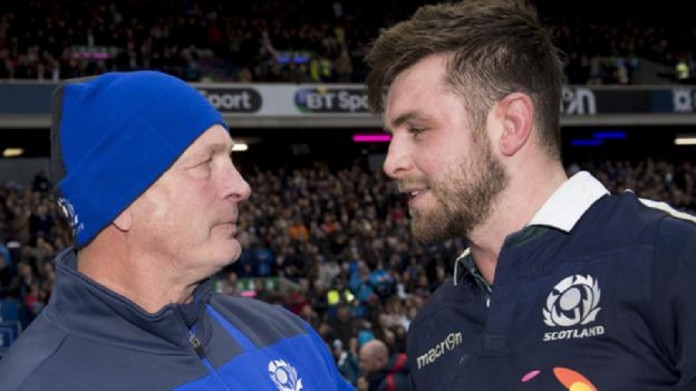At the end, it wasn’t only the match that Scotland had won in a riot of colour and noise that was on the mind but also the road they had travelled.
The decade of failure against the Welsh was finally over, blown to kingdom come by a team that is no longer emerging but that has emerged. That is, in the here and now, a contender.
Nine games and nine defeats over 10 years against the Welsh. All sorts of defeats. Little ones, big ones, heartbreaking ones, mortifying ones.
We talk about the misery that the English, the Irish and the French have visited upon Scotland in the dark years from 2000, but none of them have inflicted 10 straight years of pain.
This was supposed to be 11. No Alasdair Dickinson and WP Nel, no Sean Maitland, no Duncan Taylor, no Greig Laidlaw, no Josh Strauss. Most, if not all, of those injured players would have been in Vern Cotter’s team on Saturday.
Cotter never uttered a peep about absent leaders, but they were hard to ignore. In the mind’s eye, you thought of them pre kick-off and said ‘If only…’
Before the deluge of joy washed over Murrayfield and swept the Scotland supporters away in a glorious wave, there was a passage of play that had a wearying familiarity.
Scotland were trailing 13-6 at the time. They’d not long lost John Hardie to injury – another injury for the openside, another contribution to the body bank.
Jonny Gray was in possession, moving forward, trying to take the physical battle to the Welsh. The lock hit a wall of red in that moment, Alun Wyn Jones and Justin Tipuric smashing into him and driving him back.
The aesthetic wasn’t good. Gray rarely goes backwards, but here he was, driven into retreat, dumped on to the floor and ransacked of the ball. Scotland’s totem had been toppled.
- Scotland beat Wales 29-13
- Injured Hardie ruled out of Six Nations
- Storming second half delights Cotter
- I wanted three points, kickers said no – Wales captain
A minute later, Scotland got done at a scrum. A few minutes after that, Scotland centre Huw Jones was penalised on the floor. Wales were turning up the attrition.
Shortly before half-time, Welsh full-back Leigh Halfpenny had a penalty to make it a 10-point game and, for a kicker of his class, it was makeable. Only he didn’t make it. The gap stayed at seven points and then dropped to four by the break.
Walking off that pitch, Scotland must have felt blessed and Wales frustrated. “We felt like we hadn’t fired a shot,” said fly-half Finn Russell later, “but there was only four points in it.”
What happened in the 40 minutes that followed not just dynamited Scotland’s losing run against the Welsh but also sent Scotland roaring back into the frame for the title. A stretch, perhaps. But they’re there, doing things that no team in blue has done for the longest time, rewriting the grim history of the past 17 years.
Twenty unanswered points in that second half – 20.
When Scotland needed their big men to appear, they delivered. Off the bench, Hamish Watson was such an ever-present menace to Wales at the breakdown that, when Sam Warburton went to bed, he might just have found himself getting tumbled out the other side by the Edinburgh openside.
The Gray brothers lay down another marker in a season of markers. John Barclay – taking over as captain from Laidlaw – led magnificently. Ryan Wilson shared a field with Ross Moriarty and, later, Taulupe Faletau, but by a million miles he was the dominant number eight.
They were the powerhouses, the men that had Wales coach Rob Howley bemoaning his team’s performance at the breakdown in that second half, that also had Alun Wyn Jones singling out Watson for mention. “He came on and did a pretty good job,” said the Wales, and probable, Lions captain. “He was influential.”
In Alun Wyn’s exacting world, that’s as big as compliments get. Lions coach Warren Gatland was in the crowd on Saturday.
How you’d love to peer into his private thoughts and see what he’s thinking about the constitution of his Lions squad now. The Welsh players have the reputation, but their counterparts, almost to a man, have the form. Surely form wins? Gatland’s selection has just got a whole lot trickier.
This is the thing about Scotland now. Give them ball and they can be lethal – get them on the front foot and watch out. Tommy Seymour’s try owed much to the beautifully delayed pass from Stuart Hogg; top players making great decisions at high-speed in tight spaces while under pressure.
Clinical Scots
Scotland had to scramble to keep their lead and their momentum. Scrum-half Ali Price and wing Tim Visser made monstrously important tackles, but all around them there were players contributing to this draining of Wales’ belief.
How dispiriting for the visitors to bust Scotland’s defence only to be denied and then watch Scotland bust their own defence and score. Howley said it once and then said it again: “The Scots were clinical.”
Hogg’s pass to Visser for the pivotal try was a glorious illustration of it, a score conjured up at speed in a narrow patch of ground. Since he first got the job, Cotter has spoken about improving Scotland’s skill-set and psychology. That try, with the multiple phases that preceded it, and the brilliance that finished it off, was Cotter’s vision writ large.
Heady days and it leaves Scotland heading to Twickenham in a fortnight for a crack at the biggest beast. They’ll be underdogs, of course, but they’ll be packing more reasons to believe than they have done at any point in the 34 years since they last won there against England. The odds are stacked against them, but this is a dangerous side travelling south.
Cotter kept it all low-key in the aftermath as only Cotter can.
On the inside, his heart would have been racing at what his players did out there. On the outside, steely calm.
The next job is the toughest in a stadium haunted by ghosts. Nobody will forget what happened the last time Scotland played at Twickenham, when the visitors gave England a fright before going down 25-13.
This one will live long in the memory, too, but for very different reasons.

















